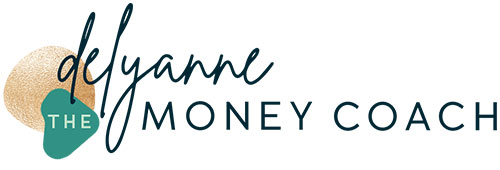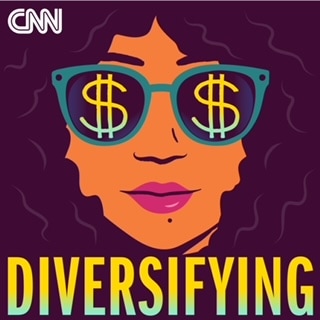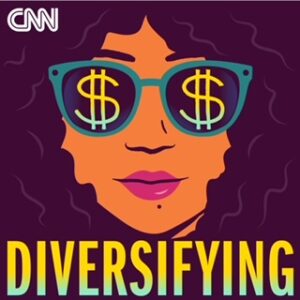No one goes into marriage hoping for divorce, but it happens all the time. This week, Delyanne talks to Dasha Kennedy, founder of Broke Black Girl, who got divorced at age 25 and sank into debt that took years to pay off. She talks to Delyanne about what you can do to protect yourself before getting married and during the divorce process.
If you enjoy Diversifying, CNN would love to hear from you. Please visit https://cnn.com/financepod to take a brief survey.
Episode Transcript
Delyanne Barros
00:00:02
No one goes into marriage hoping for divorce. Everyone is hopeful and positive in the beginning, but we have to be realistic.
Dasha Kennedy
00:00:09
Divorce impacts how a person looks at money, the money that they have, access to what their financial future may look like. And then, it happens way more than we think that it does.
Delyanne Barros
00:00:21
Let’s face it, most of us have experienced heartbreak. The emotional cost is staggering. And trust me, I felt it too. I’m a child of divorce, and I can remember clearly the lasting impact it had on my family. But when you’re married, the financial cost of a breakup can be just as significant. Dasha Kennedy knows a lot about divorce because she, like millions of other Americans, is divorced. She’s the founder of Broke Black Girl, a Facebook group which focuses on the financial struggles facing young women of color.
Dasha Kennedy
00:00:55
Divorce, it can be expensive. But the cheapest thing that you can do is to have a conversation.
Delyanne Barros
00:00:59
Like a lot of people, Dasha hadn’t thought about the financial consequences of marriage before saying, I do. Unfortunately, in the long run that would cost her. On our show this week, we’re diving deep into the economic reality of divorce with someone who was able to bounce back from it. I’m Delyanne Barros. Welcome to diversifying. At just 25 years old, Dasha’s marriage came to an end for many reasons. To complicate matters more, she and her ex-husband were never really on the same page financially.
Dasha Kennedy
00:01:39
We entered into the marriage as individuals like we were married. Yes, but we operated in our financial lives, we still operated as individuals, and it wasn’t until the divorce that we were then forced to talk about the one thing we have been avoiding, which was money.
Delyanne Barros
00:01:55
So how did it go on a day to day managing the household? How did you guys pay your bills? Did you have joint accounts? Did you combine anything?
Dasha Kennedy
00:02:01
So there were no joint accounts. It was almost like whoever grabbed the bill paid it. Like, I knew that the bills were being paid. I knew that rent was being paid. And for me, it was almost like, OK, I’m not getting any disconnection notices, so something’s happening. OK, I know that I pay this or I pay that on a bills or something is being paid. I know he’s paying something, but there was no communication. And for me, it was almost out of sight, out of mind.
Delyanne Barros
00:02:28
On the surface, nothing about their system seemed a mess, but after the divorce. Not having an honest financial conversation as a couple left Dasha with two children to care for on a single parent income.
Dasha Kennedy
00:02:42
Once we were divorced and I realized that the expenses were way more than I could afford with just my job. When I knew that I actually did depend on him to assist with things like groceries in the house, covering childcare, paying the rent, which at the time I quickly found out were my three most expensive categories that I had in my budget. It was then that I realized there was no way that I would have been able to cover all of that by myself with my paycheck.
Delyanne Barros
00:03:15
Dasha’s household expenses doubled following the loss of her ex-husband’s income. She turned to payday loans and credit cards just to maintain a sense of normalcy in her life. As a result, she sank $20000 into debt.
Dasha Kennedy
00:03:28
The very first thing that stood out to me during the divorce was the emotional attachment, which was the most expensive thing that I had to deal with during my divorce that I had with stuff. Not wanting to downsize, wanting to hold on to what was normal to me. And in the end, that cost me a lot of money, and a lot of times you will find, especially with the women that I work with, is that the emotional attachment that we have to what was our previous life.
Delyanne Barros
00:04:01
Faced with this new financial reality, she ultimately decided to downsize to a smaller apartment, but it’s still taken Daysha seven years to pay off the $20000.
Dasha Kennedy
00:04:12
I think I was able to save like forty seven percent of my money because I was no longer wrapping it up in such high rent. So the last thing that I have left to pay off is my car. And right now, I think I have like six hundred dollars left on my car. So I’m super excited. And I would be 100 percent the debt that I got into post-divorce would be 100 percent gone.
Delyanne Barros
00:04:35
And did you get any help while you were going through this process? Any guidance from family, friends, were you doing this all on your own?
Dasha Kennedy
00:04:42
So my family, even just stepping in and helping me with the children helped me reduce one of my largest expenses, which was childcare, because that was taking a very large part of my monthly income.
Delyanne Barros
00:04:52
When people say divorce is expensive, I think they’re often thinking about legal fees. And that’s true. But Dasha’s experience shows that there’s a lot more at play. Statistically, divorces are harder on women who are often the ones awarded custody of children and typically earn less income. Recently divorced women are almost twice as likely to end up in poverty compared to recently divorced men.
Dasha Kennedy
00:05:17
One of the things to always consider, especially when I think of black women, is that one in five women fall into poverty post-divorce. The income decreases, the expenses increase, debt increases.
Delyanne Barros
00:05:29
As Dasha navigated through the court system to file for child support, she realized that other women had to be going through similar experiences. She created the Facebook community, Nroke Black Girl as a resource for people to show up as themselves and receive the support she wishes she’d had during her divorce. That community has now grown to over 200,000 followers. Now, she advocates for women to actively engage in their household finances so that they can learn from her missteps.
Dasha Kennedy
00:05:58
So many women take the backseat, unfortunately, to their finances when they are married, and they either compartmentalize their role where they may be handling the grocery budget or one bill or tool versus the husband. He may be 100 percent involved with the finances. They know everything in and out. So when that person is no longer in the home, you’re oftentimes thrown into survival and you’re just trying to do things to stay afloat.
Delyanne Barros
00:06:24
Do you talk to your community about getting mental health support? About going to therapy to help them deal with the aftermath of divorce?
Dasha Kennedy
00:06:32
Yes, it’s not normal for you to, you know, be married. Start building a life with each other. And then now you’re a few years later, you have to scratch all of that and start completely over. Every emotion that you are feeling is is valid. I just assume that we’re in love. Everything will make sense.
Delyanne Barros
00:06:54
What’s love got to do with it? I think a wise woman once said that. After the break, we’ve got a bit of a history lesson for you. We’re taking a trip to the past when marriage was mostly a financial agreement. Stay with us. Welcome back to Diversifying before we continue our conversation with Dasha Kennedy, I want to take a few minutes for a sidebar.
Journey with me back to 1643 to Colonial America. That’s when the first divorce in America was granted. The Puritan Quarter Court of Boston allowed a woman named Anne Clark to divorce her husband, Dennis Clark, for abandoning Anne and their two children. Ugh time is a flat circle. Divorce is a lot more common now, according to government records. There were nearly 630000 divorces and annulment in the United States in 2020, so it sounds crazy that married women couldn’t get a divorce without proof of wrongdoing until the 1960s. Denying unmarried women credit cards was legal until the 70s. That’s only about 50 years ago. Societal attitudes toward marriage and divorce have changed since then. But so much of Dasha’s experience her feelings of shame, her discomfort discussing finances with her ex-husband is a purposeful result of the way traditional heterosexual marriage disempowers women. Rebecca Traister, writer and author of several books including All the Single Ladies summed this up on NPR in 2016.
Rebecca Traister
00:08:37
For so long, for so many generations, in so many centuries in this country and in many places across the world because women had less freedom and less economic opportunity were not sexually liberated. That there were great social and economic tolls for having children outside of wedlock, women were dependent on their husbands.
Delyanne Barros
00:08:59
My point is that if you are a married woman, especially a woman of color and are feeling like the system is against you at every turn. That’s because it is. Chances are that if you’re a woman married to a man, you’re making less than he is and are shouldering the majority of the household and child care duties. My own mom faced the same obstacles when she and my dad split up. We were immigrants, you know, and for years she was a stay at home mom, and overnight she had to become the breadwinner for a family of four. OK, thanks for time traveling with me. Now back to the present and Dasha Kennedy, another big piece of advice she’d give to women going through a divorce is not to rely on the court system to get back on their feet.
Dasha Kennedy
00:09:45
You will come to find really quickly that there is no one making sure that your partner is going to abide by, your ex-partner, is going to abide by the divorce decree. So if you’re granted, we’re going to say, a thousand dollars in child support and then you go out and you get an apartment based on the expectation of getting this one thousand dollars and then that money never happens. You really won’t have the income or the ability to take them back to court, and enforce the decree. So you, in most cases, just have to take it. These were a lot of things that happened post divorce that a lot of people do not see between the media in TV and social media. They highlight these high profile divorces as if women are walking away with the golden ticket. Like all, women are walking away with 50 percent of everything their ex-partner had that they are getting these million dollar divorce. That’s not happening every day. That’s not the reality of a lot of women. So getting started is really accepting what the new normal is and then rebuilding your life from there solely based off the income that you have and the expenses that you need.
Delyanne Barros
00:10:57
That is such good advice and it’s so heartbreaking. But it also triggered me because that was our experience too. Like my father didn’t pay ever a dollar of child support like we were on our own from the jump. And there was no recourse for us, you know, to deal with that situation. So I agree. I think that you have to assume that that money, even if you are getting paid it now, it may not always be there. So you got plan for that contingency. I couldn’t agree more. What are some, you know, unique issues that you see black women specifically facing when it comes to divorce, whether it’s in the relationship or in the legal system?
Dasha Kennedy
00:11:35
So the very first thing that sticks out is the societal norms that are pushed on us the Gold Digger title.
Delyanne Barros
00:11:44
You’ve heard it. I’ve heard it. The Gold Digger trope. It’s a common cut down for women who know their worth, but unfortunately it’s been cemented in popular culture through songs like Kanye West 2005 hit of the same name. And one of the most well-known bars of that song goes a little something like this.
Kanye West
00:12:05
If you ain’t no punk holla we want prenup, we want prenup yeah. It’s something that you need to have. Cause when she leaves your ass she gon leave with half. 18 years.
Delyanne Barros
00:12:15
Which brings me to a topic I actually enjoy discussing, prenups. We’ve gone in-depth about the financial and emotional cost of divorce. So now let’s talk about what you can do to protect yourself going into a marriage. A prenuptial agreement is a written contract created by two people before they are married. That stipulates how they want their money, among other things, to be treated in the case of a divorce. It’s as essential to a marriage as insurance
Dasha Kennedy
00:12:44
I’m not getting in my car every day anticipating an accident. But I am covered in case it happens. It’s the exact same thing with the prenup. I’m not getting married with the anticipation that we’re going to get a divorce, and if we get a divorce, I don’t want him to have anything. I’m simply saying we’re here in the event that something happens. Let’s make sure we’re both protected.
Delyanne Barros
00:13:09
Hey, I’m for prenups all around. I’m not just prenups for women. Prenups all around. Let’s have the conversation before marriage. So tell us what are some of the benefits of getting a prenup?
Dasha Kennedy
00:13:20
I didn’t know that women could initiate prenups, until I was almost 30. 100 percent honest because every time that I’ve seen a mention of a prenup, it was a man initiating the prenup to someone else. It was the man saying, I have the money. Sign this to prove to me that you don’t want me for my money. In every book that I read, in every TV show, in every movie, in everything that played out online, this was all that I saw. So the misconception is that it’s one sided, but I don’t think people understand the benefit of creating a prenup while you’re both in love while you’re both level headed. And it’s not just to protect my money from my partner or his money from me, but it’s for us to say, let’s create a plan in case everything goes left.
Delyanne Barros
00:14:13
Yeah, it’s usually seen as something that’s detrimental to women, like why would a woman want? And it’s going to hurt her when in fact, there are already laws in place that are detrimental to us. If you don’t have a prenup, the court is going to decide. So it’s better that you have a hand in this, you know, scenario that you have some kind of say then to leave it up to a judge who is for sure not going to know anything about you or have any emotion one way or another about how this goes down.
Dasha Kennedy
00:14:39
When I brought this up before, I got some pushback from men and they were saying, Well, why marry someone if you don’t trust them? And that’s again, that’s another stereotype and narrative that’s pushed on women, to now it’s about emotions versus facts, it has nothing to do with me not trusting or me being scared. It has everything to do with facts. This is how I express my love to you by initiating this conversation about money, making sure we’re on the same page. You’re safe, I’m safe, and I’m creating a space where we can thrive together with money already considering and knowing how tough it is to discuss money and relationships.
Delyanne Barros
00:15:20
That was Dasha Kennedy teaching us how to be smart about money in marriage and divorce. I love hearing how people like Daysha turn a low point into a success. Next Monday, we’re doing something you might think is impossible making taxes fun. No, seriously.
Duke Moore
00:15:38
It’s very important to always pay the IRS exactly what you owe them. You don’t want to tip them. You know, when we go to the bars or go to a restaurant, that’s when we tip. We tip our servers. We definitely don’t want to tip the IRS we want to pay the exact amount that’s due.
Delyanne Barros
00:15:53
If you’ve got a story you’d like to tell me or a question you’d like answered. You can give me a call at two zero two five three nine seven three seven zero. Leave me a voicemail and let me know what you’re thinking. Diversifying is a production of CNN Audio. Megan Marcus is our executive producer and Haley Thomas is our senior producer. Our producers are Alex Stern, Kinsey Clarke and Madeleine Thompson. Our associate producer is Charis Satchell and our production assistant is Eden Getachew. Eduardo Ocampo is our intern. Mixing and sound design by Francisco Monroy artwork designed by Brett Ferdock, Original Music by Andrew Eapen. Our technical director is Dan Dzula, with support from Chip Grabow, Steve Kiehl, Anissa Wells, Abbie Fentress Swanson, Tameeka Ballance-Kolasny, Ashley Lusk, Lindsay Abrams, Rafeena Ahmad, Lisa Namerow, and Courtney Coupe. I’m Delyanne Barros. Thanks for listening.
© 2022 Cable News Network. A Warner Bros. Discovery Company. All Rights Reserved. CNN Audio’s transcripts are made available as soon as possible. They are not fully edited for grammar or spelling and may be revised in the future. The audio record represents the final version of CNN Audio.




